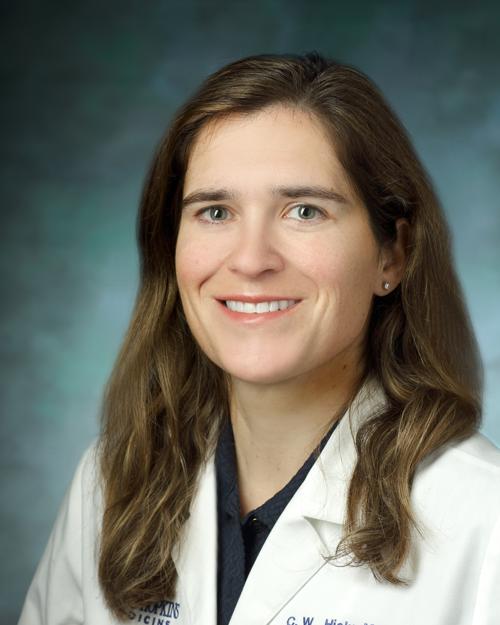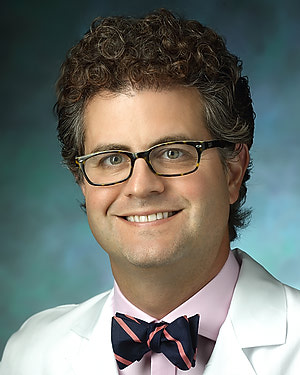-
Caitlin Hicks, MD MS

- Associate Fellowship Program Director, Vascular Surgery & Endovascular Therapy
- Associate Professor of Surgery
Letter from the Program Directors

Welcome to the Johns Hopkins Hospital Vascular Surgery and Endovascular Therapy Fellowship Program. We sponsor a fully accredited, traditional two-year fellowship for applicants who have completed five years of general surgical training. Each year, we accept one or two fellows (alternating years), with the goal of training leaders not only in the field of vascular surgery and endovascular therapy, but in all medicine.
Johns Hopkins medical institutions are steeped in tradition. The Johns Hopkins Hospital has been ranked nationally in the top five of U.S. News & World Report’s Best Hospitals rankings for more than 20 years. The Department of Surgery is the birthplace of modern surgical training, with chairpersons including Halsted, Lewis, Blalock, Zuidema, Cameron and Freischlag.
Similarly, the Division of Vascular Surgery and Endovascular Therapy has a long history of excellence. William Halsted described the first aneurysm repair in 1912, Bertram Bernheim wrote the first textbook on vascular surgery and G. Melville Williams originated the retroperitoneal approach.
Under the former guidance of Dr. Bruce Perler and the current leadership of Dr. James Black III, the division has grown to include multiple service lines that expand on the interdepartmental, collaborative efforts that Johns Hopkins is known for nationally and internationally. These include the Dana & Albert “Cubby” Broccoli Center for Aortic Diseases, the Stroke Center, thoracic outlet syndrome, and the Multidisciplinary Diabetic Foot and Wound Clinic. Each service line affords the fellows unparalleled exposure to difficult vascular diseases and their surgical management.
The fellowship, which includes a wide array of both open and endovascular procedures, is one of the busiest in the nation. Fellows typically complete the required ACGME-defined category minimums before the end of their first year. The service is divided into three teams, giving each fellow a level of independence in decision-making and patient management, as well as the ability to be mentored equally by each attending staff member.
The ACGME recently approved an increase in our fellow complement to three trainees based on our high-volume clinical experience. This has resulted in more dedicated time in the outpatient clinical setting, as well as time to engage in meaningful research opportunities and to prepare for the RPVI in the Vascular Lab. It also allows more dedicated time to preoperative planning of complex endovascular cases, increased academic productivity and a decrease in the frequency of home call.
Numerous clinical research projects are performed throughout the year. The Johns Hopkins Surgery Center for Outcomes Research (JSCOR) within the Department of Surgery provides the division with expert statistical assistance. Dr. Caitlin Hicks, vice chair of research for the Department of Surgery, mentors fellows in clinical research. Fellows are encouraged and expected to present their research at national society meetings, for which time off and full funding for travel are provided. Furthermore, protected time is set out for the junior fellow(s) to travel to the Society for Vascular Surgery Vascular Annual Meeting and the senior fellow(s) to the Moore course hosted by UCLA.
Thursdays are a protected educational morning with lectures from expert Johns Hopkins faculty on a wide range of topics related to vascular surgery and vascular medicine. During this education day, we use the VSCORE curriculum to provide didactic learning and review recent cases in preparation for the oral board exam. We also have two invited lecture series, the Brandi Rutherford Memorial Lecture and the Miller Family Lectureship in Vascular and Cardiac Disease, which bring world-renowned vascular surgeons to Baltimore to speak on vascular topics.
The training at Johns Hopkins is unparalleled. The breadth of both open and endovascular cases and their level of complexity prepare the fellows for any future career they choose. We hope you will consider applying to our program. Applications are made through ERAS, the Electronic Residency Application Service at the Association of American Medical Colleges. If you have any questions, please feel free to contact me at cabular1@jhmi.edu or our administrator, Crystal Blick, at cblick2@jhmi.edu.
Johns Hopkins Medicine Virtual Tour for Prospective Applicants
Learn more about Johns Hopkins Medicine by viewing our virtual tour for prospective applicants of fellowships, residents and continuing medical education.



